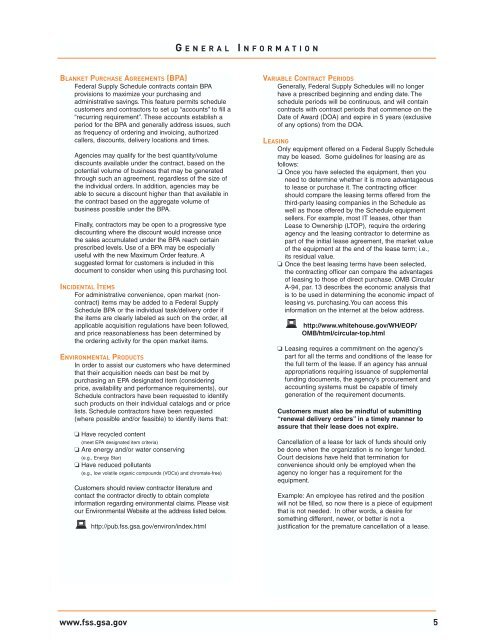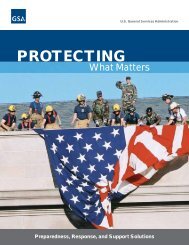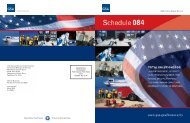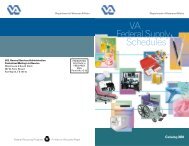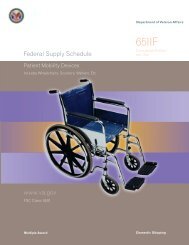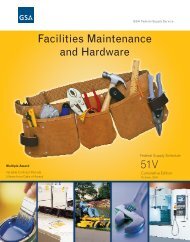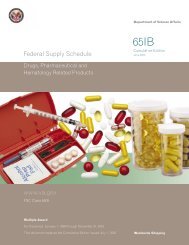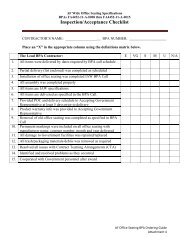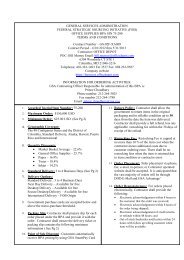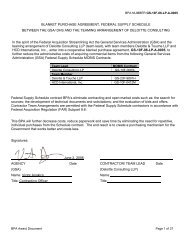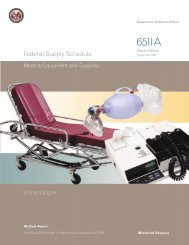71 III E
71 III E
71 III E
You also want an ePaper? Increase the reach of your titles
YUMPU automatically turns print PDFs into web optimized ePapers that Google loves.
G ENERAL<br />
I NFORMATION<br />
BLANKET PURCHASE AGREEMENTS (BPA)<br />
Federal Supply Schedule contracts contain BPA<br />
provisions to maximize your purchasing and<br />
administrative savings. This feature permits schedule<br />
customers and contractors to set up “accounts” to fill a<br />
“recurring requirement”. These accounts establish a<br />
period for the BPA and generally address issues, such<br />
as frequency of ordering and invoicing, authorized<br />
callers, discounts, delivery locations and times.<br />
Agencies may qualify for the best quantity/volume<br />
discounts available under the contract, based on the<br />
potential volume of business that may be generated<br />
through such an agreement, regardless of the size of<br />
the individual orders. In addition, agencies may be<br />
able to secure a discount higher than that available in<br />
the contract based on the aggregate volume of<br />
business possible under the BPA.<br />
Finally, contractors may be open to a progressive type<br />
discounting where the discount would increase once<br />
the sales accumulated under the BPA reach certain<br />
prescribed levels. Use of a BPA may be especially<br />
useful with the new Maximum Order feature. A<br />
suggested format for customers is included in this<br />
document to consider when using this purchasing tool.<br />
INCIDENTAL ITEMS<br />
For administrative convenience, open market (noncontract)<br />
items may be added to a Federal Supply<br />
Schedule BPA or the individual task/delivery order if<br />
the items are clearly labeled as such on the order, all<br />
applicable acquisition regulations have been followed,<br />
and price reasonableness has been determined by<br />
the ordering activity for the open market items.<br />
ENVIRONMENTAL PRODUCTS<br />
In order to assist our customers who have determined<br />
that their acquisition needs can best be met by<br />
purchasing an EPA designated item (considering<br />
price, availability and performance requirements), our<br />
Schedule contractors have been requested to identify<br />
such products on their individual catalogs and or price<br />
lists. Schedule contractors have been requested<br />
(where possible and/or feasible) to identify items that:<br />
❏ Have recycled content<br />
(meet EPA designated item criteria)<br />
❏ Are energy and/or water conserving<br />
(e.g., Energy Star)<br />
❏ Have reduced pollutants<br />
(e.g., low volatile organic compounds (VOCs) and chromate-free)<br />
Customers should review contractor literature and<br />
contact the contractor directly to obtain complete<br />
information regarding environmental claims. Please visit<br />
our Environmental Website at the address listed below.<br />
http://pub.fss.gsa.gov/environ/index.html<br />
VARIABLE CONTRACT PERIODS<br />
Generally, Federal Supply Schedules will no longer<br />
have a prescribed beginning and ending date. The<br />
schedule periods will be continuous, and will contain<br />
contracts with contract periods that commence on the<br />
Date of Award (DOA) and expire in 5 years (exclusive<br />
of any options) from the DOA.<br />
LEASING<br />
Only equipment offered on a Federal Supply Schedule<br />
may be leased. Some guidelines for leasing are as<br />
follows:<br />
❏ Once you have selected the equipment, then you<br />
need to determine whether it is more advantageous<br />
to lease or purchase it. The contracting officer<br />
should compare the leasing terms offered from the<br />
third-party leasing companies in the Schedule as<br />
well as those offered by the Schedule equipment<br />
sellers. For example, most IT leases, other than<br />
Lease to Ownership (LTOP), require the ordering<br />
agency and the leasing contractor to determine as<br />
part of the initial lease agreement, the market value<br />
of the equipment at the end of the lease term; i.e.,<br />
its residual value.<br />
❏ Once the best leasing terms have been selected,<br />
the contracting officer can compare the advantages<br />
of leasing to those of direct purchase. OMB Circular<br />
A-94, par. 13 describes the economic analysis that<br />
is to be used in determining the economic impact of<br />
leasing vs. purchasing.You can access this<br />
information on the internet at the below address.<br />
http://www.whitehouse.gov/WH/EOP/<br />
OMB/html/circular-top.html<br />
❏ Leasing requires a commitment on the agency’s<br />
part for all the terms and conditions of the lease for<br />
the full term of the lease. If an agency has annual<br />
appropriations requiring issuance of supplemental<br />
funding documents, the agency’s procurement and<br />
accounting systems must be capable of timely<br />
generation of the requirement documents.<br />
Customers must also be mindful of submitting<br />
“renewal delivery orders” in a timely manner to<br />
assure that their lease does not expire.<br />
Cancellation of a lease for lack of funds should only<br />
be done when the organization is no longer funded.<br />
Court decisions have held that termination for<br />
convenience should only be employed when the<br />
agency no longer has a requirement for the<br />
equipment.<br />
Example: An employee has retired and the position<br />
will not be filled, so now there is a piece of equipment<br />
that is not needed. In other words, a desire for<br />
something different, newer, or better is not a<br />
justification for the premature cancellation of a lease.<br />
www.fss.gsa.gov 5


